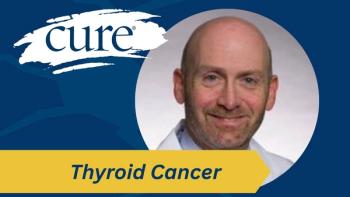
Communicating With Care Providers While on Therapy for DTC
Discussion on how best to communicate with care providers while undergoing therapy for iodine-refractory differentiated thyroid cancer.
Episodes in this series

Transcript:
Lori Wirth, MD: Gary, what kind of advice do you have as an advocate for patients when they’re working with their physicians to make these kinds of treatment decisions? Do you find that there’s a role for patient-to-patient guidance?
Gary Bloom: I still believe that speaking with another patient who may be ahead of you in the journey and on the same medication can be somewhat helpful in terms of explaining in a more candid way than even a doctor may. For example, when you’re talking about diarrhea, in our society, there are certain things that are taboo to discuss. When people bring up diarrhea, there’s always that snickering that happens, but you find out when you have cancer, with people who are going through severe treatments, diarrhea is a very natural discussion to have. What does that mean? To hear Jim say that he felt like he almost needed to live in his bathroom, well, that may be different than the message the doctor gives when they’re rattling off a number of adverse effects and, “Hey, you may have diarrhea.” Well, that’s not what I heard Jim just say. Diarrhea is something that you have for a moment and then you move on, but that’s not what Jim was explaining to us. Having that occasion to have a heart-to-heart with another patient can be very revealing. I’m a big believer that the best thing we can do as patients is be prepared for every meeting that we’re going to have with our doctor. Do we have questions that we want to get clarity on?
To Molly’s point, this includes being very honest about what we’ve been experiencing. I haven’t been on a multikinase inhibitor and I’m not apologizing for that, but I have been on a suppressive dose of levothyroxine, and I do know what that can feel like. I’ve met people who have raced off to the emergency department because they said, “Well, my doctor told me that I might feel like my heart was beating fast, but I wasn’t prepared for my heart trying to break out of my chest.” We have to know what our experiences are so that we can tell them to you. I’m not saying that we should wait until our next appointment in 3 months. If you’re having this uncontrollable diarrhea, you need to talk to your doctor now, so that you can get rushed to the nutritionist to talk about mechanisms to make your life more manageable. To me, it’s all about transparency. How do we communicate with our doctors? It is helpful having someone, like Jim has with Molly, watching us and saying, “Yes, write that down. That’s a problem, and don’t dismiss it.” The ideal scenario, if you’re going to have thyroid cancer—and you don’t necessarily wish that upon people—is to have someone there to remind us, “Pay attention to this, write this down, convey this to your doctor.” A second set of ears and eyes at all times is really helpful. For example, Jim just told us he could dismiss certain things, but Molly doesn’t. I’m watching this and smiling because it’s everything that you, the doctors, experience; patients are not always the best at conveying their symptoms. I will take Jim and myself down a step and say that men are even worse at this.
Molly Lesniak: I was thinking when you were talking about the thyroid suppression, because they suppress his thyroid, they also raise his level of thyroxin, which also counteracts with how patient I have to be some days, because he isn’t.
Lori Wirth, MD: Another aspect of the patient-to-patient support and communication is what Jim has described in terms of some of his adverse effects; they sound really awful and really scary and intolerable. Yet, Jim, you’ve been on 14 mg of lenvatinib for about 2 years now, and you look pretty good. You’ve been doing a lot. You’re down enjoying yourself in South Carolina, whereas up here in the Northeast, we’re cold and just lived through winter. It’s important to know that for most patients, these therapies, when they’re needed, are indeed manageable. There are days that can be quite difficult, but there are also, hopefully for most people, many wonderful days filled with great quality of life, or at least manageable quality of life, given all things considered.
Bryan McIver, MD: I agree with what you’re saying there, Lori. I think it’s really important for us to recognize that there is a trade-off when we’re using Lenvima [lenvatinib] and other tyrosine kinase inhibitors and other chemotherapies, but we can usually make that trade-off worthwhile. Drugs like Lenvima do work very effectively. Sometimes their responses are very durable and last for many months and years. They offer the opportunity to sustain a high quality of life, not cure the disease of course, but at least push off the date of our demise by months and years. If we can buy 3 or 4 or 5 years of high-quality life, maybe that bridges us to the next new treatment that comes down the pike toward us through additional clinical trials of novel agents. That’s the way I like to think about this journey. It’s a journey whose end we can’t see, but so long as every step along the way is about living, not just surviving, and managing the adverse effects of the drugs we’re on effectively, then I believe that this trade-off is worthwhile.
Transcript edited for clarity.





